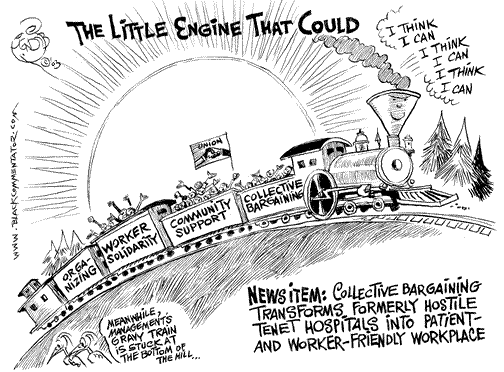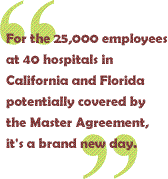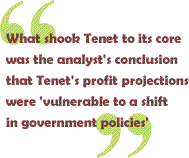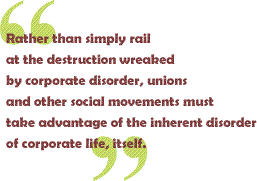
By Peter Gamble, BC Publisher

Progressives
speak constantly of the destabilizing role that giant corporations
play in American society. After years of gritty "trench
warfare" with what had been the "worst" company
in the rapidly privatizing health care industry, two of the
nation's largest unions found a way to flip the script. The
future of organized labor lies in strategies that effectively
threaten to destabilize the targeted corporation, itself,
rendering its business plan worthless and stock value, questionable.
Such
is the core lesson that emerges from last month's historic
agreement between two allied unions - the Service Employees
International Union (SEIU) and the American Federation of
State, County and Municipal Employees (AFSCME) - and Tenet
Hospital Corporation, the most aggressive privatizer of community
hospitals in the country. It is a complex tale that in the
end turned on a simple premise: Absent labor peace, Tenet
could not fulfill its business plan or achieve projected earnings
through continued acquisition of new hospitals. Tenet was
forced to learn that it needed a Master Agreement with its
employees. The unions proved that they could destabilize the
guys with the money.

 Tenet's
President and new acting CEO, Trevor Fetter, admitted as much,
May 14. "Tenet has been the only large multi-hospital
system in California that is primarily non-union," said
Fetter, in a conference call to the company's largest stockholders.
"As you know, we have been the target of a corporate
and organizing campaign by several unions in California which
has become contentious, costly and disruptive. This agreement
radically changes those dynamics for the better."
Tenet's
President and new acting CEO, Trevor Fetter, admitted as much,
May 14. "Tenet has been the only large multi-hospital
system in California that is primarily non-union," said
Fetter, in a conference call to the company's largest stockholders.
"As you know, we have been the target of a corporate
and organizing campaign by several unions in California which
has become contentious, costly and disruptive. This agreement
radically changes those dynamics for the better."
That's
an understatement. In signing the agreement, Tenet went from
being "primarily non-union" to, in the words of
SEIU Health Care Division director Larry Fox, "the first
healthcare company that is a majority union company."
For the 25,000 employees at 40 hospitals in California and
Florida potentially covered by the Master Agreement, it's
a brand new day.
"In
the first pay period after they vote to have a union, they
get their first raise, then they elect local bargaining committees
to do local issues," said Fox. Management is to remain
"neutral" in the elections process, a near-guarantee
of SEIU and AFSCME representation since, says Fox, "we
start with the assumption that 60 percent want a union. With
the general crisis in health care, workers are concerned about
their livelihoods."
Express
line to a raise
Registered
nurses receive an immediate 8 percent raise in the first year,
7 percent in succeeding years of the four-year contract, housekeepers
around 6 percent in the first year. The company has also agreed
to include employees in shaping a "nationwide quality
improvement initiative and a national training and upgrading
program" - a mechanism that enables employees to avoid
being "structured out" of their jobs. The "partnership,"
as Tenet President Fetter describes it, also allows the unions
to gather vital data on the changing health care industry,
on a national basis. Thus, the unions will know as much about
the industry as their opposite corporate numbers, and a lot
more than anybody in the public sector - information of strategic
value in coming battles.
Just
as importantly, the agreement empowers AFSCME and the SEIU
to strengthen their ties to the public at large - the patients.
 "This
is a huge breakthrough for everyone who works in these Tenet
hospitals, and for their patients too," said Luisa Blue,
RN, President of the SEIU Nurse Alliance of Southern California.
"For registered nurses and other health care professionals,
it means having a real voice in patient care decisions in
their hospitals."
"This
is a huge breakthrough for everyone who works in these Tenet
hospitals, and for their patients too," said Luisa Blue,
RN, President of the SEIU Nurse Alliance of Southern California.
"For registered nurses and other health care professionals,
it means having a real voice in patient care decisions in
their hospitals."
Under
the Master Agreement, union employees at Tenet's four hospitals
in right-to-work Florida will get the same deal as their counterparts
in California, a "huge breakthrough," said Fox.
"If workers want to have a union, they do it on the basis
of the Master Contract."
The
sea change in labor relations could not have been foreseen,
a year ago. Traditional organizing methods, fashioned in the
days before the advent of hyper-aggressive, voraciously acquisitive
national and multi-national corporations, now often lead to
nowhere. "We would not have organized Tenet just by passing
out leaflets in front of a hospital," said veteran organizer
Fox. "If you just use traditional methods of organizing,
the workers just get slaughtered."
Corporations
have elevated union-avoidance to a high art. "If you
get over the hurdles and manage to win an NLRB election you
suddenly realize there is just no power" and wind
up with an agreement that "more resembles what you have
in a right-to-work state in the South," said Fox. "You
might get two or three percent raises" - not much more
than might be expected at a non-union hospital, and not enough
to risk your job for.
Cornering
the health market
AFSCME
and SEIU are the most politically astute unions in the nation,
skilled at leveraging their combined memberships of 3 million
to maximum legislative and state house effect. But corporate
money plays that game, too, with platinum chips. At best,
unions have managed only to slow the corporate assault on
the civil and public sectors - institutionally embodied in
the nation's non-profit hospitals, under siege by Tenet and
the even larger Hospital Corporation of America (HCA). These
corporate vacuum machines scour the landscape for hospitals
that are on the ropes because of a national funding system
that is "under attack" - by the same forces that
demand privatization. The financial disarray is so acute,
says Fox, "it can't be resolved" except by legislative
means - a perfect environment for Tenet and HCA's feeding
frenzy.
It's
a big market. Of 5,000 acute care hospitals, nationwide, only
750 are for-profit. Tenet and HCA own about 300 of them. The
rest of the national acute care system represents growth and
escalating stock prices for the privatizers, who seek to buy
up blocks of hospitals in targeted cities in order to create
health monopolies and, eventually, raise the price of care.
 Tenet
became a darling of Wall Street by squeezing the system until
the poor screamed. SEIU's Fox calls Tenet's treatment of uninsured
patients "turbo-charged." The corporation was notorious
for garnishing wages, and for attaching the homes of unemployed
workers who fell behind in their bills. Medical "discounts"
that are available to insured patients were denied to the
uninsured, 85 percent of whom, Fox points out, work for a
living.
Tenet
became a darling of Wall Street by squeezing the system until
the poor screamed. SEIU's Fox calls Tenet's treatment of uninsured
patients "turbo-charged." The corporation was notorious
for garnishing wages, and for attaching the homes of unemployed
workers who fell behind in their bills. Medical "discounts"
that are available to insured patients were denied to the
uninsured, 85 percent of whom, Fox points out, work for a
living.
More
insidiously, Tenet manipulated its patient services so that
a disproportionate amount of their hospitals' procedures could
be billed at "market rates" through a "loophole"
in Medicare regulations - the rush to cutthroat advantage
that would lead to Tenet's management's undoing.
SEIU
and AFSCME, close collaborators in health care since they
abandoned fratricidal turf warring a few years ago, pressed
the political buttons as best they could. Non-profit hospitals
are considered "charitable assets" of the communities
in which they operate. Sale to for-profit outfits like Tenet
and HCA must be reviewed by the state attorney general's office,
and hospital boards can sometimes be swayed by arguments more
powerful than the purchaser's checkbooks.
The
SEIU plan to stop the healthcare conglomerate's expansion
began when it blocked Tenet's attempt to purchase a small
cancer research hospital in California. Next came a big opportunity
in Kansas City, where 11 non-profit hospitals were put on
the block, the kind of "market position" a privatizer
kills for. Tenet was said to have the inside track on the
deal. The SEIU advised the hospitals that they should reconsider
selling to anyone, "but if you do, don't sell to Tenet."
Competitor HCA walked away with the prize. But the Tenet juggernaut
rolled on.
Following
Kansas City, Tenet attempted to purchase a unionized hospital
in Pottstown, Pennsylvania. An aroused SEIU stopped the sale.
After that, "we had Tenet's attention," said Fox.
Wall
Street intervenes
 The
fatal crack in Tenet's armor was revealed, ironically, by
Wall Street analysts, who discovered that a large chunk of
Tenet's earnings were based on the "loophole" in
medical payment regulations so methodically exploited by Tenet's
portfolio builders. The corporation's reputation was shredded
when, in October of last year, the FBI raided a Tenet-owned
hospital in Redding, California, where two doctors were suspected
of performing unnecessary heart surgeries so that they could
be billed through the loophole at "market rates."
However, that's human interest news, of little concern to
Wall Street. What shook Tenet to its core was the analyst's
conclusion that Tenet's profit projections were "vulnerable
to a shift in government policies" - not a good bet for
investors.
The
fatal crack in Tenet's armor was revealed, ironically, by
Wall Street analysts, who discovered that a large chunk of
Tenet's earnings were based on the "loophole" in
medical payment regulations so methodically exploited by Tenet's
portfolio builders. The corporation's reputation was shredded
when, in October of last year, the FBI raided a Tenet-owned
hospital in Redding, California, where two doctors were suspected
of performing unnecessary heart surgeries so that they could
be billed through the loophole at "market rates."
However, that's human interest news, of little concern to
Wall Street. What shook Tenet to its core was the analyst's
conclusion that Tenet's profit projections were "vulnerable
to a shift in government policies" - not a good bet for
investors.
In
the space of a few weeks, Tenet's stock plummeted from $52
a share to $14. (It now hovers around $16.) The topmost heads
at the company, rolled. Trevor Fetter took the big seat.
The
unions turned their megaphones up, and cajoled Democrats with
clout in California to advise Tenet that now was the time
to seek some semblance of stability by making peace with SEIU
and AFSCME, who were ready with their Master Agreement.
With
his fellow capitalists howling all around him, Fetter welcomed
the chance for four year's of workplace calm. "We have
simply provided an orderly mechanism for employees to choose
whether or not they want to join a union," he explained
to the hardliners, last month. "If they choose to join
one of the unions that are in our peace accord then they will
know in advance what the terms of an agreement will look like."
The other side of this coin is that Tenet will also know what's
in its future, on the labor front.
Fetter
paid the unions their due in a March 19 talk to investment
analysts, the people who can make our break a company quicker
than the thickest picket line.
I
must also tell you that most of the negative publicity that
the company faces in California and a certain degree of
legislative activity is sponsored and fomented by the unions
and I have heard from many shareholders that they receive
e-mails from the TenetMonitor, which is a very helpful Web
site in understanding what is happening at Tenet, but it
is sponsored by the SEIU ... and I must tell you that the
unions are a formidable force in California .... "
In
addition to the union agreement, Fetter promised "to
figure out how to give the uninsured some discounts"
on treatment and to cease attaching the homes of the unemployed.
Corporate
pressure points

SEIU
and AFSCME strategists are under no illusion that they engineered
the Tenet reversal by dint of their own genius. Wall Street
analysts, after all, blew the big whistle on the corporation's
over-valued stocks. However, the unions had their megaphones
in place, and were able to "capitalize" on revelations
of Tenet's frailties at the critical juncture.
The
employer's weak points are no longer clustered at the plant
gate or the hospital receiving room. Rather, they may be hiding
in the folds of padded portfolios, or the contradictions of
their business plans. "In the most global sense, the
American labor movement needs to figure out how to deal with
huge national and international companies if we are going
to survive," said the SEIU's Larry Fox. "That old
style of one-by-one [organizing] is an obsolete style, when
the community hospital has been bought by a national chain."
There
is a larger lesson in this story. Hospital corporations operate
in the same environment as the rest of corporate America.
The bubble they seek to inflate around themselves is filled
with the hot air of speculation, nowadays based on relentless
acquisitions and fantastic projections of future profits.
Their business plans are largely wish lists, fragile documents
of intentions.
Like
a mad herd that never sleeps, these omnivores ravage the social
and economic fabric of the nation, creating a chaos in which
security is just a memory. Yet they live and breath in a world
of death by headline. Each of these corporations is headed
by cutthroats willing to exploit the rumored weaknesses of
the other before an audience of speculators whose thumbs turn
up or down faster than any crowd at a Roman Coliseum.
 To
bring the fight to the enemy, one must threaten what they
hold most dear. An executive may not cry out when an expendable
company is hit by a strike. But he writhes at the prospect
of the lost acquisition, and comes unglued when moods turn
sour on the only "Street" that counts in his world.
To
bring the fight to the enemy, one must threaten what they
hold most dear. An executive may not cry out when an expendable
company is hit by a strike. But he writhes at the prospect
of the lost acquisition, and comes unglued when moods turn
sour on the only "Street" that counts in his world.
The
howls of Wall Street brought chaos to Tenet's corporate boardroom,
forcing the survivors to seek sanctuary in a model union contract.
Yet the stock values of virtually every U.S. corporation are
based on growth projections made of mist. Stock analysts are
all ears. There is a great deal to talk about, in every corporate
configuration. Rather than simply rail at the destruction
wreaked by corporate disorder, unions and other social movements
must take advantage of the inherent disorder of corporate
life, itself. Then plug in the megaphones, and bring chaos
to the boardroom - until they sue for peace.

Click here
to contact Peter Gamble


